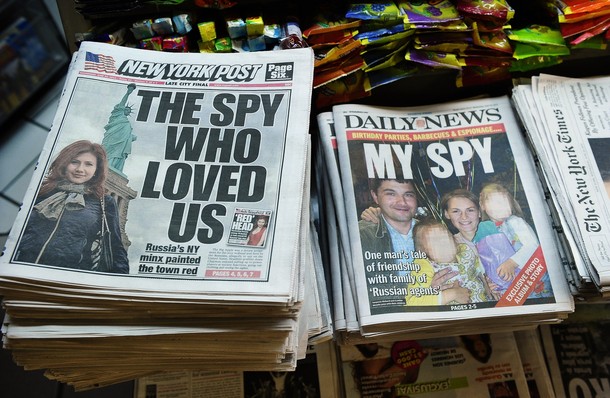
Reports of the arrests last week of 11 alleged Russian agents operating a deep cover espionage ring for Moscow Center in the heart of the United States sounded more like farce and folly than serious spying.
So far no classified material has been found in the spies’ possession and the major charge against them is failing to register in accordance with the Foreign Agents’ Registration Act.
We are also told that the FBI had been in pursuit for the past decade, secretly searching and bugging some of their homes.
The first question is whether this case reflects the James Bond side of espionage and derring-do. Or, is it better regarded as a bad Woody Allen movie? The Allen scenario, for the moment, seems to be winning.
Simply put, how could Moscow Center be so stupid? After all, even cursory use of the Internet is far more revealing in obtaining information and intelligence. Why not hire Matt Drudge instead?
Second, what on Earth was the FBI doing for a decade? At face value it would seem that using disinformation to deceive Moscow was an obvious ploy, in essence “doubling” the foreign operatives and duping or coercing them into providing doctored intelligence to the SVR, the post-Soviet equivalent of the KGB. Yet, that doesn’t appear to have been tried.
Third, why was this plot disclosed now as opposed to several years ago or kept quiet until sometime in the future?
Finally, if news reports are accurate, would it not have been a better tactic to handle this plot that makes the Keystone Kops look good as fatuous, employing sarcasm and humor rather than handcuffs and incarceration in dealing with these alleged operatives? After all, it looks as if Moscow spent a great deal of money and took great risk to achieve nothing. We can only hope that this fiasco suggests just how incompetent the Russian government or the intelligence part may be.
Of course, other explanations are at least as likely. Some argue that the Russian historical penchant for secrecy is such an obsession that merely by putting a classified stamp on the most banal piece of trivia makes it important. Hence, whatever “intelligence” this team might have gathered, by virtue of its deep cover, was regarded as important. Good! However, this interpretation seems superficial.
The Russians could have been mimicking China and how it has positioned itself to gather information and intelligence on the United States, much of it commercial. To learn more, Chinese defense and diplomatic attaches have been scrupulously mining the United States for decades. And there have been a few arrests and convictions of actual espionage not merely violating FARA.
There could also be a James Bond version. Could this ring been a cover for a bolder penetration at a future date? Could it have been put in place, not by Moscow but by a third party, either to embarrass Russia and the United States or for its own purposes? Indeed, could this have been a disinformation plot from the beginning possibly with roots here? As daft as that sounds, it is no wackier than the story to date.
Similar logic applies to the FBI. After 10 years of counter-intelligence activities, for the time and money expended, the benefit seems nil. Perhaps this ring might have metastasized into the equivalent of an Aldrich Ames or Robert Hanssen and done inestimable damage to the United States. But that seems quite a stretch.
The likelihood that the real story — if there is one — gets out is probably quite small. It may well be that knuckleheads were in charge in Moscow; the FBI couldn’t believe the ineptness of the trade craft or the trivial nature of the information that was being accumulated; and was expecting a much bigger catch at a future date that would never come and ended the case.
Interestingly, after a short blow up by Russian Prime Minister Vladimir Putin, neither Washington nor Moscow has had much to say on the affair.
Besides a laugh, what might be learned from this saga? The first is that the near instantaneous availability of knowledge and information, through blogs, cellphones and cellphone cameras and Google Earth has revolutionized the pursuit of intelligence. Analysts rather than spies dominate that universe.
Next, personal relations count. Spies won’t tell us what Afghan President Hamid Karzai or Russian President Dmitry Medvedev thinks or how they will act. Nor are spies necessarily the best means to understand foreign culture.
Finally, maybe James Bond and Woody Allen do coexist in the world of spy craft. If that is the case, better to see the movie.
Harlan Ullman is senior adviser at Washington’s Atlantic Council and chairman of the Killowen Group, which advises leaders of government and business. This article was syndicated by UPI. Photo credit: Getty Images.
Image: Russian%20spies.jpg
